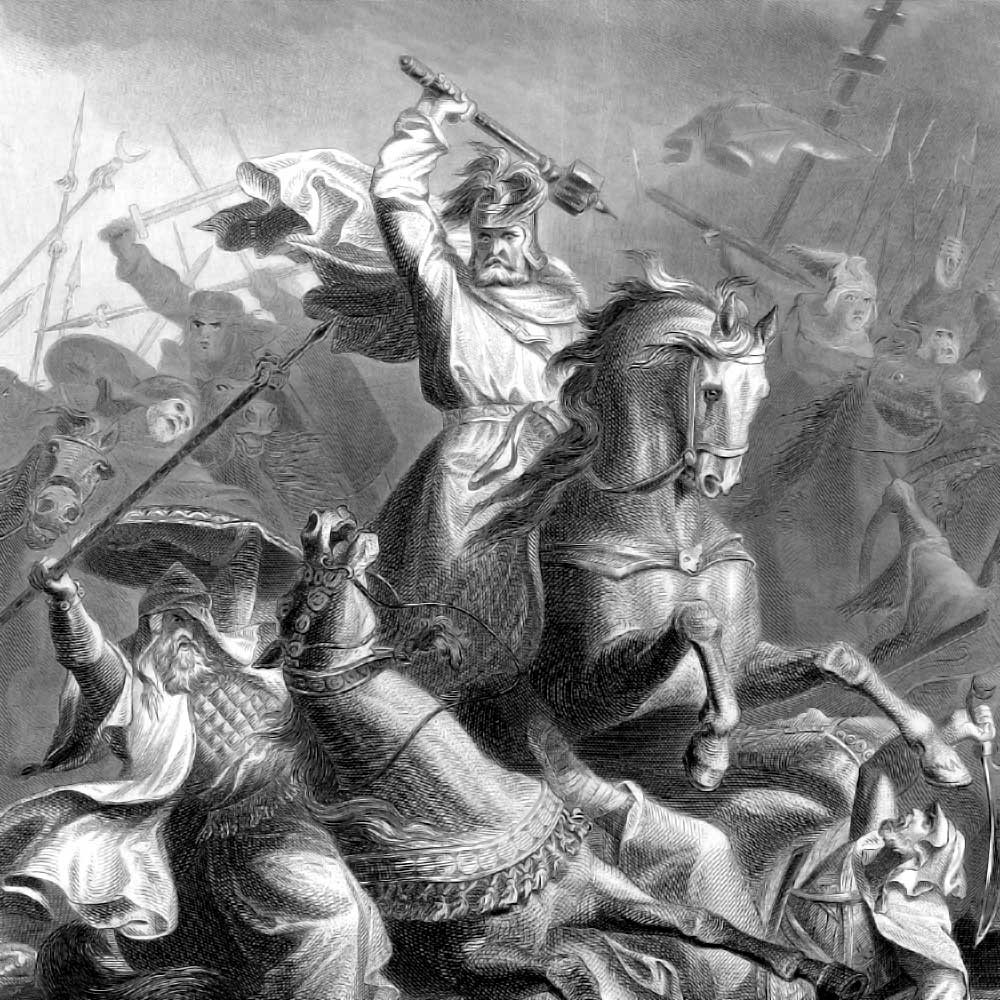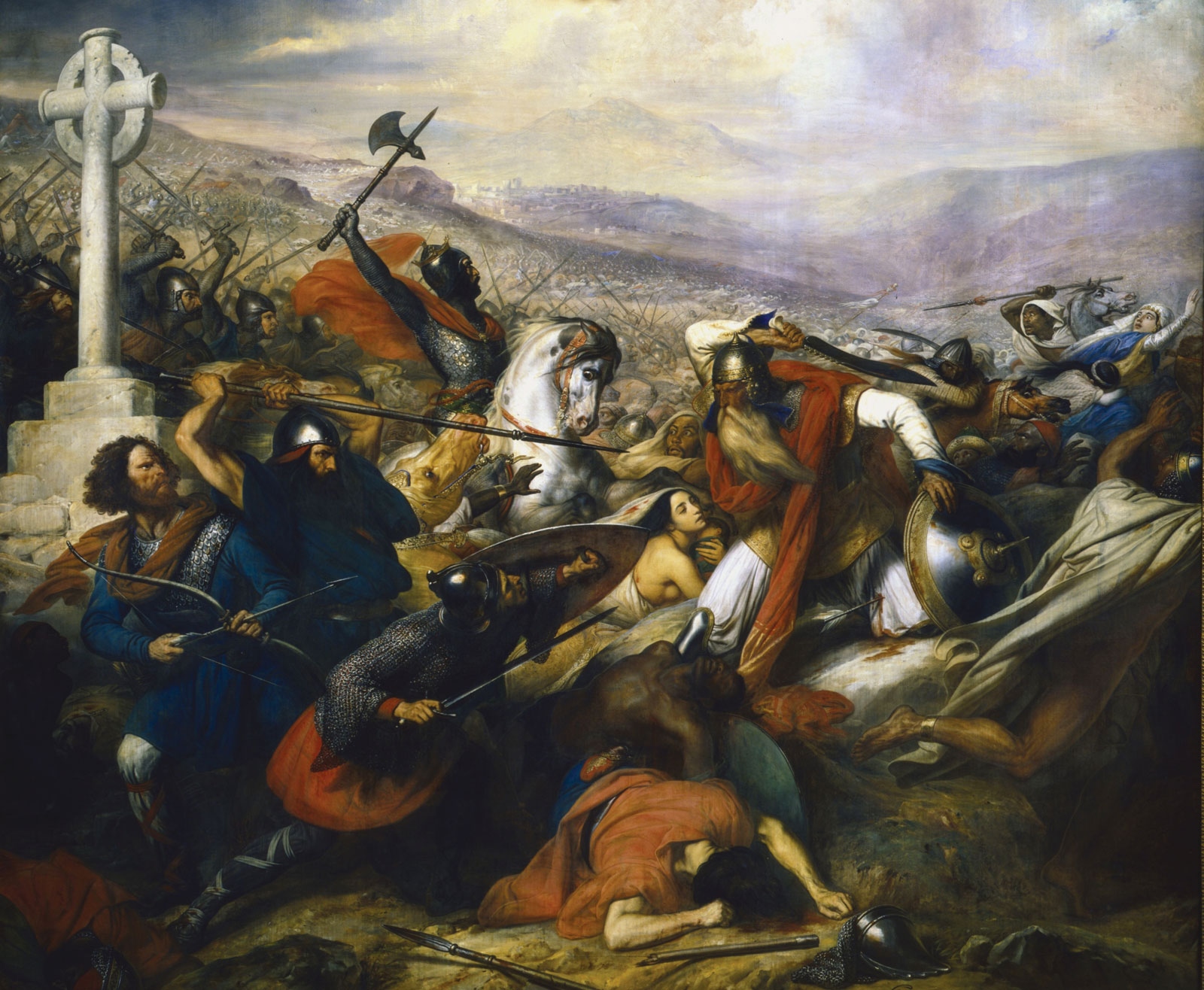On this day in the year 732 was the Battle of Tours. Charles Martel rallied the first knights of Christendom to Poitiers, France. Mohammed’s 100-year-old pedophile cult had massacred its way across the Middle East and North Africa. Obama’s “religion of peace” had conquered Spain, and all they had to do was push through France, and Europe would have been theirs. If they had succeeded, Europe today might be known as Eurabia. There would have been no peaceful Middle Ages, no Reformation, no Western civilization, no colonizing of the New World for Christ, no scientific revolution or artistic treasures. The entire history of the West might have been unrecognizable.
The Umayyad Caliphate was at the time perhaps the world’s foremost military power, called a “desolating storm” by Arabs. The army had plundered Bordeaux and utterly devastated southern Gaul. According to one Muslim historian, the “faithful pierced through the mountains, trampled over rough and level ground, plundered far into the country of the Franks, and smote all with the sword, insomuch that when Eudo came to battle with them at the River Garonne, he fled.”
Charles, the duke and prince of the Franks, and his army were outnumbered by the enemy by at least two to one. He had no standing army, but for the last decade, since the Battle of Toulouse, he had prepared troops for battle using funds from church property that he seized (property that he had previously donated). He planned to take the enemy by surprise with a Greek-style phalanx on a high wooded plain, forcing the enemy to fight him on the ground of his choosing. He spread his men through the trees to make his army seem larger than it actually was. Though it was unthinkable at the time that unarmored infantry could repel armored and mailed cavalry, Charles knew that securing the high ground, forcing the Umayyads to rush uphill, would minimize the advantage of their cavalry.
Fighting alongside Charles in the army that day was Holger the Dane, who had previously fought the Franks for their incursions into Danish territory, but now joined them in their last stand in defense of the West. Holger has become a figure of Danish legend now who, like King Arthur, rests in sleep, to be awakened in the time of his country’s greatest need. His place of rest is said to be Kronborg Castle near Copenhagen, the site of Shakespeare’s Hamlet. Holger did not wait for the Islamic terror to reach Denmark. A similar figure in American legend is David Crockett.
Winter was approaching, and the Muslims had tents but not pelts to keep warm. Martel’s men were prepared for entrenchment, wearing bear and wolf pelts. After a seven-day standoff, the Muslims charged. Six times the Franks resisted the onslaught of the Muslim cavalry. The phalanx was eventually broken, and Charles was surrounded. But then an amazing thing happened.
Martel had earlier sent scouts on flank to raid the Umayyad base camp and free as many of their slaves as possible. When part of the Umayyad cavalry realized what was happening in the heat of battle, they broke formation and rushed to save the camp. This appeared to the rest of the Muslim army to be a full-scale retreat. So it was that on the verge of conquering the Christians, the less-disciplined Muslims were routed, and their general, Abd ar-Rahman, was surrounded and killed. Charles was given the nickname Martel, “The Hammer.”
“And in the shock of the battle the men of the North seemed like a sea that cannot be moved. Firmly they stood, one close to another, forming as it were a bulwark of ice; and with great blows of their swords they hewed down the Arabs. Drawn up in a band around their chief, the people of the Austrasians carried all before them. Their tireless hands drove their swords down to the breasts of the foe.” – The Mozarabic Chronicle of 754
“Their victory was won by the purely defensive tactics of the infantry square; the fanatical Arabs, dashing against them time after time, were shattered to pieces, and at last fled under shelter of night. But there was no pursuit, for Charles had determined not to allow his men to stir a step from the line to chase the broken foe.” – Charles Oman
Before the sun could rise the next day, the remaining Muslims retreated and fled back across the Pyrenees mountains into Spain.
Charles Martel became King of the Franks and the progenitor of the Carolingian dynasty. Saint Boniface, the “Apostle of the Germans,” credits Martel as crucial to his work in purging the idolatry of Thor from Germany. Martel’s grandson, Charlemagne, became the first Christian ruler of the European Reconquista.
It was not until 1492 that Ferdinand and Isabella entirely removed the pedophile cults from the Iberian peninsula. Consider these seven centuries of struggle, as well as the permanent imposition of Islamic culture in previously-Christian North Africa and Asia Minor, if any doubt remains as to what Islam would have wrought in Europe had Martel failed.
“A victorious line of march had been prolonged above a thousand miles from the rock of Gibraltar to the banks of the Loire; the repetition of an equal space would have carried the Saracens to the confines of Poland and the Highlands of Scotland; the Rhine is not more impassable than the Nile or Euphrates, and the Arabian fleet might have sailed without a naval combat into the mouth of the Thames. Perhaps the interpretation of the Koran would now be taught in the schools of Oxford, and her pulpits might demonstrate to a circumcised people the sanctity and truth of the revelation of Mahomet.” – Edward Gibbon
Gibbon declared “Christendom…delivered…by the genius and good fortune of one man, Charles Martel…the hero of the age.”
Poitiers “may justly be reckoned among those few battles of which a contrary event would have essentially varied the drama of the world in all its subsequent scenes: with Marathon, Arbela, the Metaurus, Châlons, and Leipzig.” – Henry Hallam
“Poitiers was the turning point of one of the most important epochs in the history of the world.” – Leopold von Ranke
“Charles Martel’s victory at Tours was among those signal deliverances which have affected for centuries the happiness of mankind.” – Thomas Arnold
“The Battle of Tours…has often been represented as an event of the first magnitude for the world’s history, because after this, the penetration of Islam into Europe was finally brought to a standstill.” – John Bagnell Bury
“One of the most important epochs in the history of the world, the commencement of the eighth century, when on the one side Mohammedanism threatened to overspread Italy and Gaul, and on the other the ancient idolatry of Saxony and Friesland once more forced its way across the Rhine. In this peril of Christian institutions, a youthful prince of Germanic race, Karl Martell, arose as their champion, maintained them with all the energy which the necessity for self-defense calls forth, and finally extended them into new regions.” – Leopold von Ranke
The Battle of Poitiers “must ever remain one of the great events in the history of the world, as upon its issue depended whether Christian Civilization should continue or Islam prevail throughout Europe.” – Godefroid Kurth
“Thus was Christendom saved in the tongue between the rivers, a little south of Chatellrault, and a day’s march north of Poitiers.” – Hillaire Belloc
“[T]he arm of Charles Martel saved and delivered the Christian nations of the West from the deadly grasp of all-destroying Islam.” – Friedrich Schlegel
Remember, remember, the Tenth of October.
| Tweet |
|
|
|






